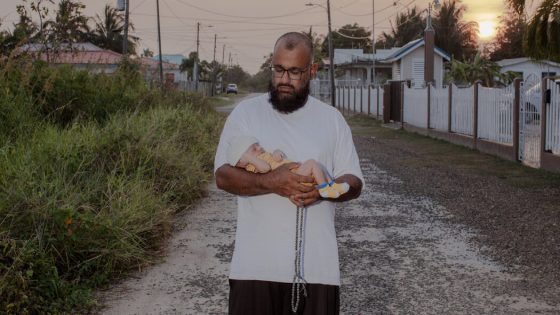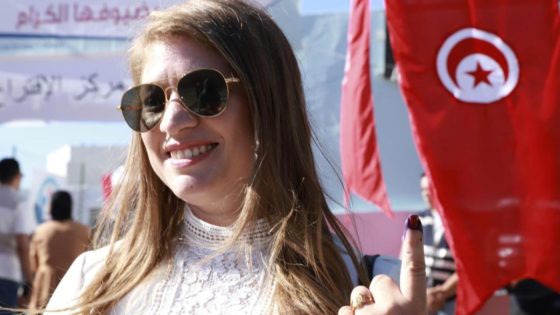On the 15th night of Ramadan in a suburb of Belize City, Majid Khan and his family of four sat down for a traditional iftar meal to break the daylight hours fast. There was a leg of a lamb that Majid, a former Guantánamo detainee, had slaughtered himself, sweets brought by a sister in Maryland, dates from Saudi Arabia.
The mood was a bit boisterous, but not enough to disrupt the sleep of baby Hamza, who was born two weeks earlier at a hospital in the Central American city. The talk was small, about whether the biryani dish was too spicy and how the lamb was perfectly roasted.
These are mundane matters, made more meaningful because Majid Khan, a former courier for Al Qaeda, was celebrating with his wife Rabia and daughter Manaal in their first home together, in Belize, their new adoptive homeland.
For two decades, this family meal was not possible. After the attacks of Sept. 11, 2001, Mr. Khan joined Al Qaeda, agreed to become a suicide bomber and delivered $50,000 that would be used in a deadly hotel bombing in Indonesia. For his crimes, he was held prisoner by the United States, tortured by the C.I.A. and then imprisoned at Guantánamo Bay. He pleaded guilty and became a government cooperator — and, all that time, his wife waited for him in Pakistan.
“I was waiting for 20 years for him,” Rabia Khan said with a sigh of contentment. “Everyone said, ‘You are brave. You are strong.’” The circumstances required it. “Now I say to Majid, ‘It’s all on you, not on me.’”
Large life questions await this family. Will Majid, 44, make a go of his nascent import business of terra cotta pots? Will Rabia, 40, need to take baby Hamza to Mexico to see a specialist for a kidney condition? Where will Manaal, 20, go to college and then become a dentist?
But other struggles loom larger.
Majid still needs to find health care for the damage he suffered in the C.I.A.’s secret overseas prisons. He has yet to fit into the country that took in his family. He has been unable to open a bank account, because of his past.
“Life is a test,” he said, describing himself as a glass-half-full guy. He sees the next chapter of his life as an opportunity to make things right. He was hurt, he said, and did things that hurt others. He punctuates his remarks with “May God forgive.”
Even among the 750 men and boys who have passed through the prison at Guantánamo, Majid Khan always stood apart.
A Pakistani, he went to high school in the suburbs of Baltimore and became radicalized there after the death of his mother in 2001. He left for Pakistan that year, after the Sept. 11 attacks, at age 21, and wed Rabia in an arranged marriage. He also joined with members of Al Qaeda, among them men who are accused of plotting the Sept. 11 attacks, and was recruited to be a suicide bomber in a never-realized attack on the president of Pakistan, Pervez Musharraf. His decisions, he says, were impetuous and wrong.
He was the first prisoner who was tortured in C.I.A. custody to plead guilty to war crimes, nearly a decade into his detention as a “high value detainee.” He spent more years isolated from other detainees than any other prisoner, much of that time as a government cooperator.
Rabia Khan spent those years as a single mother with her parents and a houseful of sisters and brothers, nephews and nieces, raising Manaal, their child who was born after Majid’s capture.
At Guantánamo, he prayed alone, slept the days away and ate alone. “You got used to it,” he said. His Ramadan rations came with three dates, sometimes a packet of honey.
They were reunited two months after his release. He met his daughter for the first time in the V.I.P. lounge at the Belize airport. The husband and wife who had been apart during their 20s and 30s did not feel like strangers.
“I don’t know why,” Rabia said. “Because of the letters, maybe?”
Manaal confides that it has been an exciting year, starting with the sudden news that the father she never met had been released from prison. Eight weeks later, she and her mother traveled 48 hours — Karachi to Doha to New York to Miami to Belize City — and joined him.
There have been visits from her father’s family in the United States, sightseeing of tourist spots along Belize’s Caribbean coast and now, a baby brother — all the makings of a most unusual gap year or two before she goes to college.
She glides around her family’s three-bedroom house with a breezy air of ownership. She has her first bedroom to herself, now bedecked with strings of festive lights. She designed Hamza’s birth announcement, with a picture of a heart-shaped balloon. She sent it out on her phone from the hospital to family in three time zones just minutes after his arrival.
Outside the home, she and her mother wear robes and cover their hair with a hijab and their faces with Covid masks, a modern version of the austere niqab. He drives the family car, a used Chevy Equinox.
“I’m a Pakistani guy at heart with a little bit of American topping on it,” he said. “So I’m a little feminist. But I do strictly believe in Muslim modesty. And honor. I have to make sure my daughter is modest until she gets married.”
The nation of Belize, with about 415,000 residents, is the size of New Jersey, with about 5 percent of its population. The official language is English, which helps. But for Majid Khan, a man in a hurry, integrating has been a challenge.
“He has yet to sync with Belizean laissez-faire,” said the leader of his mosque, Kaleem El-Amin, who goes by Brother Kaleem. “I think he needs a little more time.”
Majid has not yet set up a storefront for his business, selling painted pots from Pakistan, or found a big commercial buyer.
Part of the problem is no bank has been willing to open an international account for the man who delivered $50,000 to an affiliate of Al Qaeda, unaware, he said, of its purpose. He was already in U.S. custody by the time the money was used in a bombing that killed about a dozen people at a Marriott Hotel in Jakarta, Indonesia, on Aug. 5, 2003.
Belize blames regulations on global finance imposed after Sept. 11. A government official who discussed the problem on the condition of anonymity because it involves sensitive diplomatic ties said the issue was beyond the reach of the Belize government, calling it an “obstacle” to Majid’s establishing a sustainable business.
The family’s utilities are on the credit card of his father, who has visited for long stretches. Any business he does requires cash and, sometimes, a Belizean partner.
If his wife needs to take their baby abroad for health care, he cannot accompany them. He has Belizean residency and a pathway to citizenship, but at the request of the U.S. government, he has no travel papers.
He also needs health care for a colorectal condition and back pain he blames on the years he was in the C.I.A. black sites, where he was brutally interrogated, kept in solitary confinement and became so despairing that he refused to eat. His American captors broke his hunger strike by infusing a “purée” of hummus, pasta with sauce, nuts and raisins into his rectum, according to a declassified document.
His wife has told him that he sometimes thrashes in his sleep, he said, but he recalls no nightmares. He had two free visits with a psychiatrist but chose not to continue treatment, at $100 a visit. The doctor had no expertise in the trauma of torture and “didn’t know what prison life was like,” he said.
“I need to get patched up,” he said. “Mentally, physically.”
Each Friday, he makes the 30-minute drive to the mosque to pray in a community of Muslims, which was denied him during his time in U.S. custody. Some are Belizeans who converted to Islam or their descendants. Others are immigrants, many from Sri Lanka.
The community welcomed him from Day 1, no questions asked, said Brother Kaleem, the imam, who turned to Islam in the 1970s and trained in Saudi Arabia. That is the Belizean way — quiet, accepting.
“If he stays here long enough, maybe his children will understand this place,” he said.
Rabia Khan says her husband is a “softer” version of the man she married. In her words, he is part American, part Pakistani, part Arab — an apt description.
He prefers California dates to the Saudi variety to break a fast. He has a basketball hoop for when a nephew visits from the States. He calls American visitors, including one old enough to be his mother, “Dude.”
For the holiday, he found a Belizean with livestock, brought a ritual knife and slaughtered a sheep. Then the couple stashed the portions in their newly acquired deep freezer. Butchering was daunting. Back home, a halal butcher did it.
One evening before dinner at a Lebanese-style restaurant, he called the owner to ask if he could bring his own lamb over. It was a religious thing, Majid explained, and called it “kosher.” The restaurateur agreed.
When Majid talks about his life, his philosophy is not unlike what he told a military jury in 2021. His actions with Al Qaeda hurt people and were wrong, he said. May God forgive him. So was the torture, which he described to the panel. It was his first public account of what was done to him, and he said he forgave his captors.
“The reason I forgive is that I did a lot of bad things,” he said, sitting on his couch, the baby sleeping in the crook of his arm. “The point is, I have no grudge. I could’ve been paralyzed for 20 years from a car accident. God decided, ‘I’m going to put that test on you.’”
His time in detention was a struggle, but a formative one. He learned that he could be mean, rude and write poetry. He also spent years away from the other detainees, in the company of guards and federal agents, who sometimes passed the time with poker games and cigars.
One evening, sitting along the Old Belize River, Rabia tells a story:
Majid had been missing for years. His family did not know whether he was dead or alive until the White House announced in September 2006 that he was among a group of C.I.A. prisoners moved to Guantánamo.
From there, in a moment of deep despair, he wrote her a letter: You have my permission to start anew, to find a new husband.
First she cried, she said. She kept the message from her family. Then she sent him a furious reply.
“She told me that if I do that, I will never see Manaal,” he recalled with a shudder. “Never.”
Manaal was born in the seventh month of his detention. He had no hopes of release, had yet to take responsibility for his crimes, cooperate with the U.S. government and plead guilty.
That came later, in 2012, more than a decade before he would be freed in Belize.
Source Agencies



